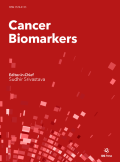Authors: Yin, Zi | Ma, Tingting | Chen, Sheng | Yu, Min
Article Type:
Research Article
Abstract:
BACKGROUD: Hepatocellular carcinoma (HCC) is characterized by occult onset, rapid progression and poor prognosis. CXC chemokines play an important role in tumor microenvironment and development. OBJECTIVE: The potential mechanistic values of CXC chemokines as clinical biomarkers and therapeutic targets in HCC have not been fully clarified. METHODS: ONCOMINE, UALCAN, GEPIA, cBioPortal, SurvExpress, MethSurv, SurvivalMeth, String, GeneMANIA, DAVID, Metascape, TRRUST, LinkedOmics, and Timer were applied in this study. RESULTS: The transcriptional levels of CXCL9/16/17 in HCC tissues were significantly elevated while CXCL1/2/5/6/7/12/14 were significantly reduced. Significant correlation was found between the expression
…of CXC3/5 and the pathological stage of HCC patients. High level of CXCL4 was associated with a longer disease-free survival. For overall survival, lower expressions of CXCL1/3/5/8 and higher expressions of CXCL2 were associated with a better outcome. In addition, the prognostic values of CXC chemokines signature in HCC were explored in four independent cohorts, the high-risk group displayed unfavorable survival outcome compared with the low-risk group. And for the prognostic value of the DNA methylation of CXC chemokines, we identified the CpGs which were significantly associated with prognosis in HCC patients. DNA methylation signature analysis also showed a statistically significant association between the high- and low-risk groups. For potential mechanism, the neighbor gene networks, interaction analyses, functional enrichment analyses of CC chemokine receptors in HCC were performed, the transcription factor targets, kinase targets, and miRNA targets of CXC chemokines were also identified in HCC. We also found significant correlations among CXC chemokines expression and the infiltration of immune cells, the tumor infiltration levels among HCC with different somatic copy number alterations of these chemokine receptors were also assessed. Moreover, the Cox proportional hazard model showed that CCR2/6/8/12, B cell, macrophage and dendritic cell were significantly related to the clinical outcome of HCC patients. CONCLUSION: CXC chemokines might serve as therapeutic targets and prognostic biomarkers in HCC.
Show more
Keywords: CXC chemokines, HCC, prognostic biomarker, therapeutic target
DOI: 10.3233/CBM-210300
Citation: Cancer Biomarkers,
vol. 36, no. 3, pp. 231-250, 2023
Price: EUR 27.50





